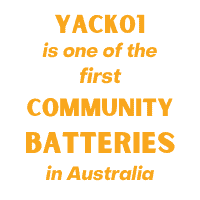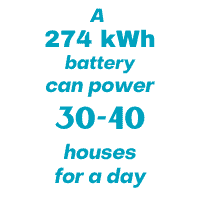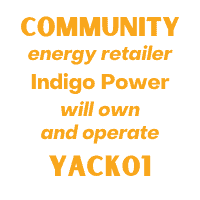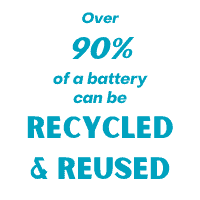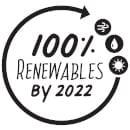A pivotal step
One of the things that’s needed when transitioning to 100% renewable energy is some form of storage: to take the renewable energy such as solar energy when it’s plentiful, and allow use at a later time when generation isn’t plentiful. The simplest solution is storage batteries.
Community owned storage batteries at a local or community scale (as opposed to a large commercial or individual household scale) are still uncommon across Australia. Integrating them with a micro-grid hasn’t been done much either! Yackandandah now has three microgrids connected into the electricity network that allows the trading and sharing of locally generated renewable energy.
Indigo Power and TRY are launching a community owned battery, Yack01. It will be a pilot project to test out installing a mid-size battery to serve a community’s energy and emission reduction needs.
Yack01 is Yackandandah’s first piece of community-scale energy infrastructure and will supply power through the network to Indigo Power customers. Coupling 274 kWh of storage with a 65 kW solar array installed at the site of an old sawmill, the battery will charge with solar during the day and discharge in the evening. In the scheme of things, 274 kWh is not a big storage battery, but it is a pivotal first step and pilot for larger community-scale projects that will follow in our quest for 100% renewable energy.
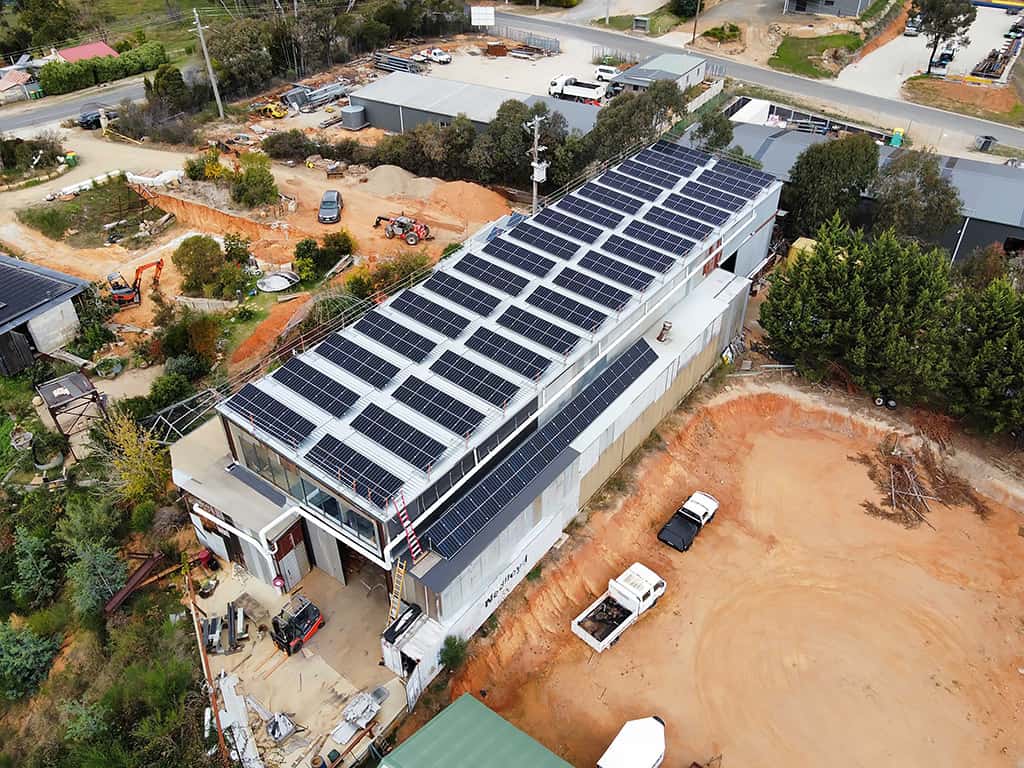
TRY and Indigo Power originally raised ~$200,000 to fund a much smaller community battery. But in mid-2020 we were thrilled when TRY received a $171,000 Victorian government grant to double the size to 274 kWh. It is a behind-the-meter, retail-facing battery – the first such community battery in Australia.
And if you’re wondering what that means, behind-the-meter means that it’s installed behind the power meter on a private property and is not owned or operated by an electricity network provider. Power meters record electricity flow in to a private property from the National Energy Market and any export from batteries or solar installations back to the NEM.
Retail-facing means that it is operated by an electricity retailer (in our case Indigo Power) to provide electricity to their customers via the National Energy Market. Charge and discharge cycles of the battery will be managed by a smart energy controller, the Mondo Ubi. The Ubi is a key feature of over 210 solar installations in Yackandandah and is part of a shift toward a more smart, dynamic and two-way energy market dominated by renewable energy systems.
What is Yack01?
Most people have heard of household storage batteries, which are typically 10-13 kWh. With conservative usage, a fully charged battery can power a home for many hours in the event of an outage.
You may have also heard of the BIG battery in South Australia, the Hornsdale Power Reserve, which had an original capacity of 129 MWh (it’s been expanded since then) and is about 10,000 times bigger than a household battery. It’s a commercial scale battery that provides specific network services during times of high demand and saved consumers in South Australia millions of dollars in it’s first two years of operations.
Yackandandah’s battery is within the two ends of that spectrum and closer to the household end. With 274 kWh it can power 30-40 homes through each evening, but it’s main use is to shift the availability of cheap locally generated solar power to times of high demand each evening.
With aspirational and generous support, Ben Gilbert, owner of the Agency of Sculpture has allowed the battery to be installed on his property. The old sawmill used a lot of power and so already had a hefty transformer providing a mains connection point which was suitable for power export. This was an important factor as it saved considerable cost.
Yack01 will provide power first to the Agency of Sculpture, and then all the excess power will be stored and/or sold to the electricity market through the power meter.
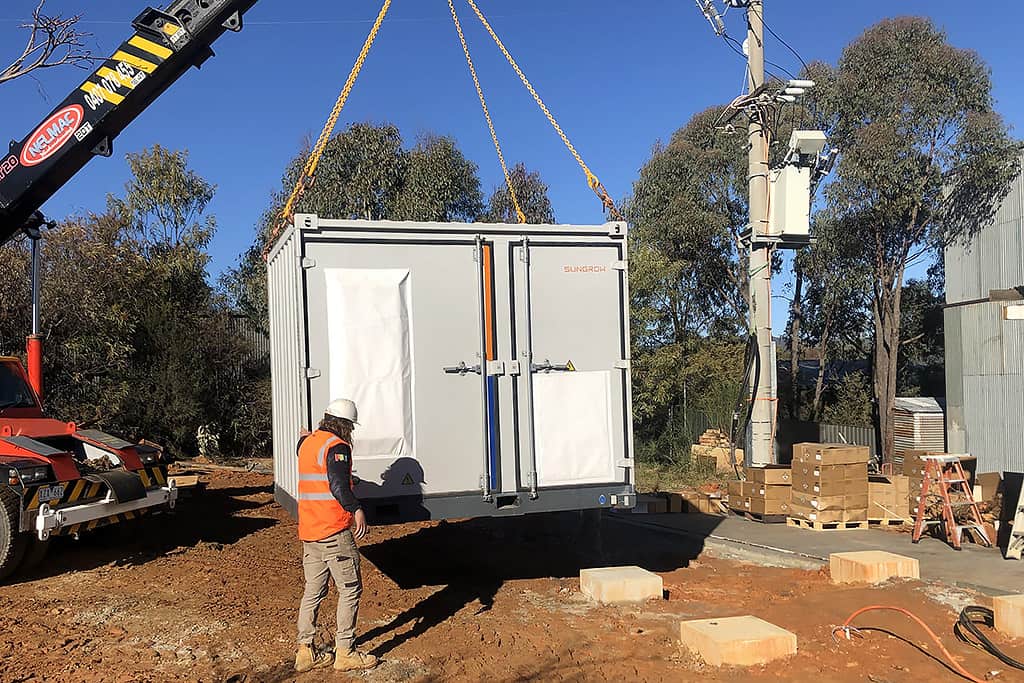
Funding & goals
In 2019, TRY raised $104k and Indigo Power took out a $100k loan with WAW Credit Union, underwritten by Sustainability Victoria, to fund a 136 kWh storage battery. Just before it was due to be ordered in mid-2020, we received a $171k grant from the Victorian government’s New Energy Jobs Fund which allowed us to double the battery size to 274 kWh.
It has taken 2 years to raise the necessary funds, to work through the design, planning and installation process and deal with delays due to the COVID pandemic. The battery is due to be commissioned in July 2021.
Yack01 is a pilot project to demonstrate the feasibility of a behind-the-meter community battery and it’s integration into the grid, in addition to contributing towards our 100% renewable energy goal.
Partners & ownership
We are enormously thankful to the partners that have made this project possible. Ben Gilbert’s enthusiasm for the project and willingness to adapt a planned building expansion to accommodate the solar array and battery location were crucial. Ben’s Agency of Sculpture will host the battery via a long term lease agreement.
Indigo Power, the community energy retailer and social enterprise that was started by members of TRY, has undertaken the project management and will own and operate the battery. They have had to navigate the realms of planning applications, network requirements, and delays in the battery delivery after the pandemic disrupted supply chains in 2020.
Both the battery and the solar panels were installed by Solar Integrity, a locally based installer, and other local contractors Sherringham Construction, Boschetti Industries and Platinum Electrical did the construction and electrical works. The battery will be commissioned by the battery manufacturer, SunGrow.
The tracking and sharing of local energy within the minigrid is made possible by an energy-sharing widget developed by Mondo (a subsidiary of AusNet Services). Customers of Indigo Power with one of these devices, called an Ubi, will be able to see how much power is contributed by community assets such as Yack01. The battery cycling will increasingly be managed by Mondo as part of new electricity services made possible with batteries. These services can be used to support the network and market stability.
Mondo has been a long-term partner and significant supporter of Totally Renewable Yackandah since 2016. For Yack01 they have provided important contract engineering inputs, purchasing and connections support. Excitingly work is well underway with Mondo on leveraging the dynamic capabilities of batteries to improve the performance of the local network and extract advantage for pricing via the electricity market. Watch this space!!
Lastly, the battery in its current form and size would not have been possible without generous contributions from many individual donors, philanthropic organisations and the grant funding from the Victorian government.
Equity and access
In the rapid transition to clean energy, many advocates for a switch to renewables highlight the importance of making sure the people who can least afford upfront capital costs do not get left behind. Community solar and battery systems are an excellent solution to this challenge. People can choose to buy their electricity from green sources by selecting them from a retailer product list. Whilst this tends to cost more than standard tariffs, it can be coupled with modifications around a home to reduce consumption (many of which make homes more comfortable to live in).
Residents in Yackandandah will be able to buy locally generated power via the social enterprise Indigo Power, who themselves will return 50% of their profits back to the communities in which they operate. Until Yackandandah can generate 100% of our energy needs locally, Indigo Power purchases the required balance of electricity from their back-end retailer, Energy Locals, who supply 100% carbon offset electricity. In this way, anyone can participate in the renewable energy transition by becoming customers of Indigo Power. This is an empowering opportunity as many people would like to contribute to the 100% renewable energy goal and reduce their emissions.
TRY continues to uncover methods of helping people reduce their power consumption – both to save money and reduce emissions. Most notably this includes an energy coaching program as well as annual efforts to replace traditional hot water services with efficient CO2 heat pumps.
End of life considerations
One of the other considerations is what happens to batteries when they reach the end of their useful life – a question that is pertinent to both storage batteries in installations such as these, solar panels, and the batteries in electric vehicles or EVs. (You can read an article about recycling of these components here.) The nominal lifespan of the batteries used in Yack01 is 10 years, however they can be used for up to 15-20 years with a somewhat reduced storage capacity.
Currently the infrastructure and industries to manage recovery and recycling of these batteries are in their infancy. However, there is at least one company in Australia that can recycle batteries such as the ones in Yack01. It is possible to recover over 90% of the battery components, due to advances in the treatment and recovery of the battery components and base materials, which include nickel, cobalt, and lithium, all of which can be individually recovered and reused in new batteries.
Recycling also reduces the need to mine the raw minerals, which is controversial due to the use of child and slave labour in some countries. Some of the major battery manufacturers are now actively working on their supply chains to only use suppliers with ethical and fair labour practices, but this is a work in progress. A major part of this is making the supply chains transparent as the raw minerals usually pass through many hands before they get to the battery manfacturer.
The main impediment to battery recycling is the need to build the infrastructure for collecting and transporting old batteries. This will take time and would be hugely boosted by the implementation of product stewardship legislation, ensuring that manufacturers incorporate end-of-life planning when making products, and is something which the federal and state governments have been consulting on for a few years now. Public pressure would help that to be expedited.
Battery and solar panel recycling will become a global imperative and will be emerging industries to accompany the move to a renewable future. It is something that TRY and Indigo Power are very conscious of and recycling will be carefully considered in any replacement or end-of-life decisions for Yack01.

Stay up to date
If you’d like to keep up to date with our latest ventures, follow the TRY Facebook page, look at the news feed on this website, or subscribe to the TRY mailing list. As a subscriber you’ll get a quarterly newsletter and the occasional email about upcoming events. And if you’d like to demonstrate your support, you can also become a member of TRY or Donate!
